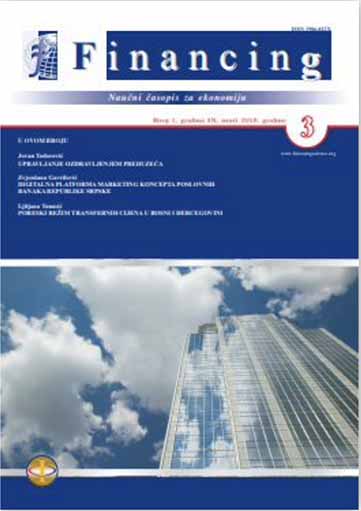Uticaj kreativnog računovodstva na kvalitet finansijskog izvještavanja: empirijsko istraživanje u Republici Srpskoj
The impact of creative accounting on the quality of financial reporting: empirical research in the Republic of Srpska
Author(s): Siniša RajkovićSubject(s): Economy, National Economy, Business Economy / Management, Financial Markets, Accounting - Business Administration
Published by: Finrar d.o.o Banja Luka
Keywords: Creative accounting; Discretionary-accruals model; Jones model; multiple linear regression; earnings management;
Summary/Abstract: he growing number of frauds and financial scandals in the last few decades has justified the skepticism and fear of external users regarding the credibility of the financial statements presented by the reporting entities. Numerous financial scandals and frauds (Enron, WorldCom, Parmalat and many others) have dealt a heavy blow to the accounting and auditing profession and shaken the confidence of interested users in financial statements. Empirical research was conducted on a sample of 400 reporting entities in the Republic of Srpska for the period 2016-2019 with the aim of examining the impact of creative accounting on the quality of financial reporting. The constructed model of logistic regression indicates that the predictive influence of discretionary accruals on the auditor’s opinion is statistically significant for the significance level of 0.1. The strength and direction of the correlation between the dependent (quality of financial reporting) and independent variable (creative accounting) was examined using the Pearson coefficient, which indicated the existence of a negative correlation between DACC values and audit opinion and that this correlation was statistically significant (rpb = – .042, n = 1600, p = .088). This means that as the value of the DACC increases (as a measure of creative accounting), the likelihood that the auditor’s opinion has a qualification (modification) also increases. The results of the Omnibus test show that in the group of companies audited by one of the audit firms of the “big four”, discretionary accruals statistically significantly affect the auditor’s decision for the significance level of 0.1 ((χ = 5.007, p = 0.072 which is less than 0.1 On the other hand, the results show that in the group of companies whose financial statements were audited by audit firms outside the “big four”, discretionary accruals have a statistically insignificant effect on the auditor’s final decision for significance level 0.1 (χ = 0.036, p = 0.849 which is greater than 0.1).
Journal: Financing - naučni časopis za ekonomiju
- Issue Year: 12/2021
- Issue No: 3
- Page Range: 17-27
- Page Count: 11
- Language: English, Serbian

